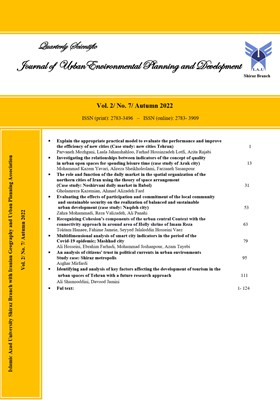Multi-dimensional analysis of smart city indicators in the period of the Covid-19 pandemic; The case study of Mashhad city
Subject Areas : Urban planningAli Hosseini 1 * , Ebrahim Farhadi 2 , Mohammad Joshanpour 3 , Azam Tayebi 4
1 - Department of Human Geography, Faculty of Geography, University of Tehran, Tehran, Iran
2 - Department of Human Geography, Faculty of Geography, University of Tehran, Tehran, Iran
3 - Department of Human Geography, Faculty of Geography, University of Tehran, Tehran, Iran
4 - Department of Human Geography, Faculty of Geography, University of Tehran, Tehran, Iran
Keywords: Smart governance, covid 19 pandemic, Smart city, smart people, Smart Economy,
Abstract :
In general, smart cities rely on information and communication technology to improve urban life, and smart city concepts are known as efforts to improve urban performance and the desire to provide solutions for urban problems in order to provide a higher quality of human life. As we saw during the Covid-19 era, governments around the world have turned to mandatory urban quarantine to make social distancing more effective. In these conditions, limited physical movements and daily activities were done regularly through remote work, which can be seen as the importance of urban smartness. In this research, the realization of a smart city with electronic and virtual government infrastructures and the smartening of government services by applying the main components of smart dynamics, smart economy, smart environment, smart governance, and smart people during the outbreak of Covid-19 in Mashhad were discussed. This research, in terms of method, is apart from quantitative-qualitative research, in terms of purpose, it is apart from applied research, and in terms of nature, and it is descriptive and analytical. In order to create a base of existing primary factors about the factors affecting the smart city, the technique of environmental scanning and literature review have been used. To collect information, documentary and survey methods were used, which used the questionnaire method. The results showed that the components of smart people, smart governance, and smart economy had the highest correlation with the concept of a smart city. In fact, by improving the mentioned components, the concept of a smart city will be realized largely. In the end, it can be said that the most effective component is smart people, and according to the results obtained from the statistical tests of the spread of the Covid-19 disease in the city of Mashhad, it has increased the component of people, governance, and smart economy.Extended AbstractIntroduction: The continuous spread of the virus around the world puts the concept of smart cities under the microscope. As we have seen during the Covid-19 era, governments around the world have turned to a mandatory urban quarantine in order to make social distancing more efficient, in which physical movements are limited and daily activities are regularly carried out through remote work, which can be traced to the importance of urban smartness. In this article, we discuss the realization of a smart city with electronic and virtual government infrastructures and making government services smarter by applying the five main components of smart dynamics, smart economy, smart environment, smart governance, and smart people during the outbreak of Covid-19 in Mashhad.Methodology: This research has used SPSS and PLS software to analyze structures and relationships. Considering that the use of structural equations requires testing the normality of the data, for this purpose, t-tests and ANOVA were used in SPSS software. Also, the PLS software measurement model was used to evaluate the validity and reliability (Cronbach's alpha, composite reliability, and convergent validity) of the indicators, and its structural model was used to evaluate the relationship between the research variables and the indicators.Results and discussion: According to the Pearson correlation test of the components of the smart city, among the five components of smart people, smart economy, smart environment, smart governance, and smart dynamics, the components of governance and smart people have the highest correlation with each other with a correlation value of 0.878. In fact, with the increase of values in the component of intelligent people, the values of intelligent governance also change to a great extent, and vice versa, in other words, we can say that by increasing the component of intelligent people, intelligent governance can also be realized to a large extent, but from the correlation of each of the components with The realization of the smart city has the highest correlation with the smart city concept, respectively, the components of smart people (0.957), smart governance (0.913) and smart economy (0.886). In fact, by improving the mentioned components, the concept of a smart city will be realized largely. Finally, it can be said that the most influential component is smart people, and according to the results obtained from the Pearson correlation test, the spread of the Covid-19 disease in Mashhad has increased the component of people, governance, and smart economy.Conclusion: The results of the research show the change in the components of the smart city of Mashhad after the outbreak of the Covid-19 disease, and to measure the results obtained from the statistical tests, these values are compared with the relevant documents provided. Regarding people and the smart environment, it can be said that the developments of internet businesses in some goods and services activities have faced an increase in sales and recruitment of human resources. Medical consultation has increased by 22%; however, some businesses were associated with a decrease in sales and ultimately the adjustment of human resources: tourism sector with 97%, service sector by 86%, online food ordering by 60%, online advertising by 55% and online taxi with 51% have faced a decrease in demand.
_||_

